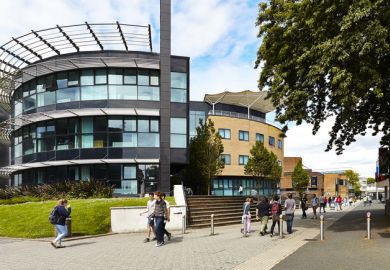England’s new director of fair access has detailed planned changes to access agreements with universities to implement his focus on “strategic school engagement, quality and non-traditional pathways”, and defending a focus on graduate outcomes in terms of “high-status jobs”.
John Blake, director of fair access and participation at the Office for Students, had trailed his call for universities to “put their shoulder to the wheel” on driving up attainment in schools. His speech to an OfS event set out how planned changes to access and participation plans (APPs) would achieve that.
“A huge driver of poor access is poor attainment. We have to shift that dial and intervene much earlier,” he said.
Mr Blake, who formerly led on policy issues for educational charity Ark, which runs the multi-academy trust Ark Schools, said that there would be a three-stage process to implement reforms made “more urgent by Covid”.
In terms of monitoring of current APPs, “we will not be requiring a monitoring return from every provider”, he said. “Instead, we will be undertaking a risk-based return of the data we hold and following up with individual providers only where we have concerns. This will be a tangible reduction in regulatory burden for the many universities and colleges that are on track to achieve the targets they have set for themselves.”
In the second stage, the OfS will be “asking providers to review their current APP and to seek variations to ensure the full scale of their work on strategic school engagement, quality and non-traditional pathways is being captured” for 2023 agreements, a process he said the regulator would “expect to begin before the summer and conclude before Christmas”.
On the third stage, Mr Blake said that “subject to consultation”, the regulator aims to bring the APP cycle in line with the term of the director of fair access, and “bring forward the access and participation cycle by one year”.
“New APPs will begin from September 2024 and will run for up to four years,” he said.
“When we consult to update our guidance for that cycle of APPs, we will include the lessons learned on strategic school engagement, quality, pathways and evaluation” from engaging with providers on variations to current agreements, he said.
The regulator would “consider using our enforcement tools in areas where providers are not meeting their commitments”, he added.
In its emerging new quality requirements, the OfS is putting a focus on graduate outcomes in terms of progression to “professional and managerial” jobs.
Mr Blake said: “Participation and progression are part of the same challenge. So we absolutely expect to be engaged in a lot of discussions about how providers are ensuring people can move on into postgraduate study, into the labour market.”
Critics have objected that “you’re making universities responsible for the entire economy”, he said.
“I’m not, but equally universities are sizeable civic entities in their local area,” he continued. “They have convening power, they have their own economic power – there are providers who sign contracts and insist that those they sign their contracts with take some of their students on as apprentices. There are ways and means of doing this.”
Mr Blake said students should have equal access to good outcomes from higher education.
“That won’t always mean a high-status job,” he added. “But we also have to be honest that that is why a lot of young people go to university. That is what they are expecting. That’s [why] providers who have invited them in…need to make sure they are putting their shoulders to the wheel to make sure the best possible outcomes for those students happen.”
Register to continue
Why register?
- Registration is free and only takes a moment
- Once registered, you can read 3 articles a month
- Sign up for our newsletter
Subscribe
Or subscribe for unlimited access to:
- Unlimited access to news, views, insights & reviews
- Digital editions
- Digital access to THE’s university and college rankings analysis
Already registered or a current subscriber?








